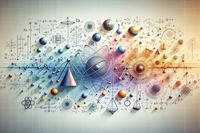New Giant Particle Accelerator to Explore the Unknown 95% of the Universe
Scientists at CERN are planning to build a new giant particle accelerator called the 'Circular Collider of the Future' (FCC) in Switzerland to uncover information about the unknown 95% of the universe.

CERN's Plan to Discover the Unknown Universe
Scientists at the European Organization for Nuclear Research (CERN) are aiming to obtain new information about the unknown 95% of the universe. They plan to achieve this through the construction of a new giant particle accelerator called the 'Circular Collider of the Future' (FCC) in Switzerland.
The proposed FCC will be three times larger and more advanced than the current Large Hadron Collider (LHC) at CERN. If the proposal is accepted, the construction cost is estimated to reach 17 billion pounds. CERN Director General Fabiola Gianotti described the new collider as a 'beautiful machine' that will enable humanity to make significant progress in understanding the universe.
This ambitious project aims to discover new particles that will contribute to a more complete theory of how the universe works. By uncovering these dark particles, scientists hope to gain a deeper understanding of the fundamental principles that govern the universe.
The Future of the Circular Collider of the Future
The construction of the FCC will take place in two stages. The first phase, scheduled to be commissioned in 2040, will involve the collision of electrons. The second phase, starting in the 2070s, will require the use of stronger magnets and heavier protons to search for new particles.
The FCC will have a length of 91 kilometers, nearly three times longer than the current collider. However, it will be built at a depth of 200 meters to prevent strong, high-energy radiation from reaching the surface. This depth ensures a safe environment for the operation of the accelerator.
The aim of the FCC is to provide answers to questions that remain unanswered by the current LHC. Scientists believe that the LHC, despite its significance in discoveries like the Higgs boson, is still unable to detect 95% of the universe. The new collider aims to uncover crucial information about this hidden majority.
Exploring the Possibilities of the Universe
The World's largest supercollider at CERN, the Large Hadron Collider (LHC), has already made groundbreaking discoveries. In 2013, the Higgs boson particle, a long-sought-after subatomic particle, was discovered during experiments conducted at the LHC. This discovery shed light on one of the greatest mysteries of the universe.
In October 2018, two new baryons were discovered and another particle was hinted at during an experiment at the LHC. These findings demonstrate the potential of particle accelerators in unraveling the secrets of the universe.
However, there is still much to explore. The FCC represents a new era of discovery, aiming to explore the unknown 95% of the universe that remains a mystery. By pushing the boundaries of scientific knowledge, scientists hope the FCC will help create a more complete theory of the universe.



